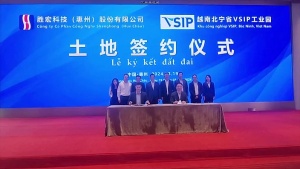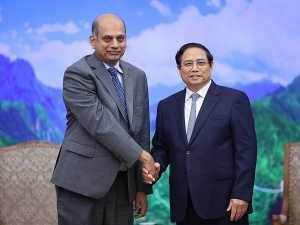Training support for chip sector sped up
Vietnamese Deputy Prime Minister Le Minh Khai last week met in Boston with US Trade Representative Katherine Tai, with both sides reaffirming to cement cooperation in sectors including science and technology, innovation, and education and training, which embraces supporting Vietnam in semiconductor workforce training via several specific projects.
During a dialogue between Minister of Foreign Affairs Bui Thanh Son and the US Secretary of State Antony Blinken last month, both sides also emphasised new focus on the energy transition, sci-tech, tech transfer, and workforce training.
 |
| Training support for chip sector sped up, illustration photo/ Source: Shutterstock |
The US will support Vietnam in workforce development initiatives for the semiconductor industry, which is considered a major breakthrough in the comprehensive strategic partnership forged last September. Vietnam is now quickening the implementation of a programme on training 50,000-100,000 high-quality engineers for the industry.
Specifically, through a package of $4 million in dedicated programmes, the US mission to Vietnam is enhancing technical skills training and workforce development at every level through expanded US-Vietnam institutional and public-private partnerships. This package includes expanded English language training for students in science, technology, engineering, and mathematics, and expanded exchange programmes focused on workforce development and expanded Fulbright scholarship opportunities for students.
The package also includes international tech security and innovation funding implemented by Arizona State University to develop workforce capacity building activities, including faculty workshops, curricula transfer, and resources to enhance assembly, testing, and packaging skills.
These programmes are based on the recommendations of an ecosystem review led by the Organisation for Economic Co-operation and Development (OECD). US industry has also launched new workforce development initiatives to expand online training and certification programmes, as well as collaborations with Vietnamese higher education institutions.
At a meeting between Minister Son and Jeffrey Goss, associate vice provost for Southeast Asia at Arizona State University, the university said it would “continue actively cooperating with Vietnam” in developing the country’s semiconductor industry.
The university is now deepening cooperation with Vietnam’s National Innovation Centre and other partners in semiconductor workforce training.
Keith Strier, vice president of US-backed Nvidia, the world leader in AI computing, told Son that the group would work with the Vietnamese side to turn Vietnam into “Nvidia’s second home” with specific projects, especially when it comes to high technology application and high-quality workforce training.
Last December, Nvidia president and CEO Jensen Huang came to Vietnam, where Nvidia has already invested $250 million, and said it wanted to establish a base in Vietnam to develop the country’s semiconductor industry.
At present, Vietnam is also working with the OECD to develop a report on the semiconductor ecosystem in Vietnam. The government has built up a national AI strategy and will soon enact a semiconductor development strategy for 2030 and beyond.
Last September, Vietnam and the US forged a new semiconductor partnership to support resilient semiconductor supply chains for US industry, consumers, and workers.
Under the International Technology Security and Innovation Fund, the US will partner with Vietnam to develop the semiconductor ecosystem, regulatory framework, and workforce and infrastructure needs.
“We will focus on boosting cooperation in sci-tech with the US, with a major focus laid on semiconductor cooperation. It’s necessary now for both nations to effectively and practically implement the memorandum, in which Vietnam must continue working with the US side about support in human resources, including the development of labs and capacity at upstream stages,” said Le Chi Dung, general director of the Department of American Affairs under Vietnam’s Ministry of Foreign Affairs.
In January, US Under Secretary of State for Economic Growth, Energy, and the Environment Jose W. Fernandez met with Vietnamese Prime Minister Pham Minh Chinh in Hanoi, reaffirming the US as an enduring partner and expressing support for the rapid development of Vietnam’s semiconductor ecosystem including human resources training and semiconductor trading. This effort includes cooperation to launch workforce development initiatives.
Fernandez revealed that 15 US companies operating in semiconductor and green technology have stated their interest in Vietnam’s chip and clean energy industries, with total capital amounting to about $8 billion.
According to German data provider Statista, revenue from Vietnam’s semiconductor market is forecast to hit $20.15 billion this year and post a compound annual growth rate of 11.62 per cent in 2023-2027, for a market volume of $31.28 billion by 2027. The largest market within the semiconductor industry is integrated circuits, with a projected market value of $16.44 billion this year.
The US is now Vietnam’s largest export market, while Vietnam is the US’s seventh-largest trade partner and the US’s largest trade partner in ASEAN.
| Bac Giang makes its play for investment in semiconductors Vietnam is hoping to emerge as a top market for semiconductor production. Luong Van Nghiep, deputy director of Bac Giang Department of Planning and Investment, told VIR’s Minh Oanh about the northern province’s potential and its strategies to draw in foreign investors in the sector. |
 | Victory Giant Technology to invest $800 million in Bac Ninh Victory Giant Technology is to invest in a high-precision, printed circuit boards project in the northern province of Bac Ninh, according Vuong Quoc Tuan, standing Deputy Chairman of Bac Ninh People's Committee following a meeting at the Chinese manufacturer's factory in Guangdong province on March 19, during Tuan's visit to the country. |
 | Lam Research to build semiconductor factories and supply chain in Vietnam American chip-making technology provider Lam Research Corp. (NASDAQ: LRCX) is keen on building factories and developing a supply chain within Vietnam's semiconductor industry. |
 | Diversification giving boost to chip targets More semiconductor players are planning to diversify their supply chain to Vietnam, reinforcing the country’s importance as an assembly and packaging hub for the chipmaking industry. |
What the stars mean:
★ Poor ★ ★ Promising ★★★ Good ★★★★ Very good ★★★★★ Exceptional
Related Contents
Latest News
More News
- Masan Consumer names new deputy CEO to drive foods and beverages growth (February 23, 2026 | 20:52)
- Myriad risks ahead, but ones Vietnam can confront (February 20, 2026 | 15:02)
- Vietnam making the leap into AI and semiconductors (February 20, 2026 | 09:37)
- Funding must be activated for semiconductor success (February 20, 2026 | 09:20)
- Resilience as new benchmark for smarter infrastructure (February 19, 2026 | 20:35)
- A golden time to shine within ASEAN (February 19, 2026 | 20:22)
- Vietnam’s pivotal year for advancing sustainability (February 19, 2026 | 08:44)
- Strengthening the core role of industry and trade (February 19, 2026 | 08:35)
- Future orientations for healthcare improvements (February 19, 2026 | 08:29)
- Infrastructure orientations suitable for a new chapter (February 19, 2026 | 08:15)

 Tag:
Tag:


















 Mobile Version
Mobile Version